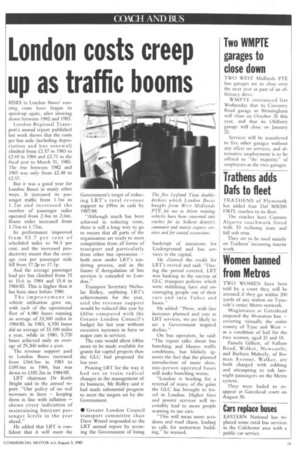London costs creep up as traffic booms
Page 21

If you've noticed an error in this article please click here to report it so we can fix it.
RISES in London Buses' running costs have begun to speed-up again, after slowing down between 1982 and 1983.
London Regional Transport's annual report published last week shows that the costs per bus mile (including depreciation and bus renewal) climbed from £2.57 in 1983 to 12.69 in 1984 and £2.71 in the fiscal year to March 31, 1985. The rise between 1982 and 1983 was only from £2.48 to £2.57.
But it was a good year for London Buses in many other ways. It increased its passenger traffic from 1.1m to 1.2m and increased the number of passenger miles operated from 2.4rn to 2.6m. Route miles increased from 1.71m to 1.73m.
Its performance improved from 93.7 per cent of scheduled miles to 94.3 per cent, and the increased productivity meant that the average cost per passenger mile fell from 17.2p to 17.1p.
And the average passenger load per bus climbed from 15 to 15.6 in 1984 and 15.8 in 1984/85. This is higher than it has been since before 1980.
The improvement in vehicle utilisation goes on, with each of the operational fleet of 4,980 buses running an average of 33,500 miles in 1984/85. In 1983, 4,930 buses did an average of 33,100 miles a year, while in 1980, 5,720 buses achieved only an average of 29,300 miles a year.
The revenue support paid to London Buses increased from £164.5m in 1983 to £189.6m in 1984, but was down to £185.2m in 1984/85.
LRT chairman Dr Keith Bright said in the annual report: "Our policy of no real increases in fares — keeping them in line with inflation — shows every indication of maintaining buoyant passenger levels in the year ahead."
He added that LRT is confident that it will meet the Government's target of reducing LRT's total revenue support to £95m in cash by 1987/88.• "Although much has been achieved in reducing costs, there is still a long way to go to ensure that all parts of the organisation arc ready to meet competition from all forms of transport and particularly from other bus operations — both now under LRT's tendering process, and in the future if deregulation of bus services is extended to London."
Transport Secretary Nicholas Ridley, outlining LRT's achievements for the year, said the revenue support would be reduced this year by £60m compared with the Greater London Council's budget for last year without excessive increases in fares or major cuts in services.
The cuts would allow £40m .more to be made available for grants for capital projects than the GLC had proposed for last year.
Praising LRT for the way it had set in train radical changes in the management of its business, Mr Ridley said it had made substantial progress to meet the targets set by the Government.
• Greater London Council transport committee chair Dave Wetzel responded to the LRT annual report by accusing the Government of being The five Leyland Titan doubledeckers which London Buses bought from West Midlands PTE for use as driver training vehicles have been converted into coaches for its Selkent district's commuter and tourist express services and/or coastal excursions.
bankrupt of intentions for ,Underground and bus services in the capital.
He claimed the credit for LRT's revival and said: "During the period covered, LRT was basking in the success of GLC transport policies which were stabilising fares and encouraging people out of their cars and into Tubes and buses."
He added: "Now, with fare increases planned and cuts in LRT services, we are likely to see a Government inspired decline."
On bus operation, he said: "The report talks about bus bunching and blames traffic conditions, but blithely ignores the fact that the planned introduction of more slow, one-person operated buses will make bunching worse.
"London is heading for a reversal of many of the gains the GLC has brought to travel in London. Higher fares and poorer services will inevitably lead to more people wanting to use cars. • "This will mean more accidents and road chaos, leading to calls for motorway building," he warned.






















































































